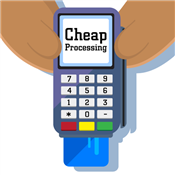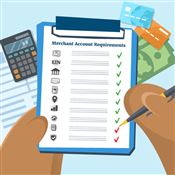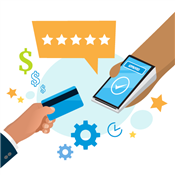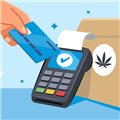High Risk Business
What does it mean to be a high-risk business? Find out what kind of businesses and industries are high risk, and the consequences of such a label.
 |
Uncertain About High-Risk Business Status?
Talk to a credit card processing expert if you're unsure about whether your business falls under the "high-risk" category.
Being labeled a "high-risk business" sounds scary, but it's not the end of the world.
It has nothing to do with your business' potential for success. This designation is given based on how much risk you might pose to credit card processors.
You may be surprised to find what kind of businesses can be considered "high risk." (Spoiler: it's not just for those selling dodgy products.)
Read on to understand what exactly it means to be high risk and how it will affect payment processing.
- What Is a High-Risk Business?
- List of Common High-Risk Businesses and Industries
- What Makes Your Business High Risk?
- High-Risk vs Low-Risk Businesses
- What is the MATCH List?
- The Consequences of Being High Risk
- How To Choose a Merchant Account for High Risk Businesses
- Best High Risk Merchant Accounts
- How to Avoid the High-Risk Merchant Label
What Is a High-Risk Business?
A high-risk business is one that is considered to have a higher risk of chargebacks, fraud, or financial failure.
It's decided by credit card processors how risky you'll be as a client. Your risk factor is usually based on:
- The industry you're in: Some industries get considerably more fraud, like gambling, adult entertainment, CBD, and tobacco/vaping.
- Your personal/business situation: If you have low personal credit, poor financial history, a previously terminated merchant account, or a previously failed business, etc.
If you're defined as a high-risk merchant, processing credit cards will be trickier. Financial institutions prefer clients that make them money and carry little risk. So high-risk businesses are often rejected by standard merchant account providers.
But don't worry, you're not out of options. There are reputable processing providers that specialize in working with high-risk businesses. Keep reading.
List of High-Risk Businesses and Industries
Here is a list of industries and businesses commonly considered to be high risk.
- 1-800 chat sites
- Adult Industry
- Airlines and Booking
- Amazon Stores
- Attorney Referral Services
- Auto Warranties
Auctions - Background Checks
- Bad Credit
- Bankruptcy Attorneys
- Business Consulting
- Business Opportunities
- CBD & Cannabis Products
- Casinos and Gambling
- Coins and Collectibles
- Continuity Billing
- Credit Monitoring
- Crypto or Forex Trading
- Dating
- Debt Collections
- Dropshipping
- Electronics
- Event Ticket Brokers
- Fantasy Sports
- Financial Planning & Advisory
- Firearms
- Furniture Stores
- Gentleman's Clubs
- Government Grants
- Health and Beauty
- High-Ticket Coaching
- Import/Export Businesses
- Magazine Sales & Subscriptions
- Mail Order Businesses
- Male Enhancement
- Membership Organizations
- Merchants on the MATCH list
- Multi-Level Marketing (MLM)
- Nutraceuticals
- Offshore Businesses
- Online Gaming
- Pawn Shops
- Pay-Day Lenders
- Prepaid Debit Cards
- Psychic Services
- SEO/SEM Services
- Skin and Hair Care
- Subscription Boxes
- Tour Operators
- Travel & Vacation Services
- Vape & Cigarettes
- Vitamins and Supplements
- VoIP Services
- Web Design and SEO
- Weapons (of any kind)
- Background Checks
What Makes Your Business High Risk?
You may think high-risk businesses are mostly those that sell shady products or services. But that's not true.
Here are reasons why businesses get put in the high risk category by credit card processing companies:
- Questionable products: This is the most obvious type of high-risk business. It might include those that sell adult entertainment, drug paraphernalia, and weapons.
- Higher chargeback rate: Some industries get more chargebacks than others. This includes travel services and electronics.
- High legal regulation: Businesses like tobacco and nutraceuticals require strict legal compliance.
- Sales model: Some businesses have questionable sales practices. For example, MLMs have a reputation for being scams. Even if you're totally legit, you'll still be treated with more caution.
- Vulnerable customers: Businesses like debt consolidation services cater to a riskier customer base.
- Subscription businesses: A lot of customers forget to cancel their subscription or free trial and then issue a chargeback.
- Online service-only businesses: Businesses that only provide an online service, like SEO/SEM, are risky because there's no tangible product and often have high value transactions.
- Bad personal credit: Providers may see you as not being financially responsible and associate that with how you run your business.
- High-dollar sales: If the average ticket size of your transactions is over $500, the chargeback risk increases. This is why businesses like furniture stores are considered high risk.
- High monthly volume: If your business regularly processes more than $20,000 a month, the risk for chargeback increases.
- International sales: Accepting foreign currencies means more risk, especially if you sell to countries with more fraud (typically, this means any countries except for the U.S., Canada, Western Europe, Australia, and Japan).
High-Risk vs Low-Risk Businesses
Here's a rough guideline to help you differentiate between a high risk and low risk business.
| Low Risk | High Risk | |
|---|---|---|
| Chargeback rate | Under 1% | Over 1% |
| Average ticket size | Under $500 | Over $500 |
| Sales volume | Under $20,000/mo | Over $20,000/mo |
| Sells internationally | No | Yes |
| Accept foreign currencies | No | Yes |
| Recurring billing | No | Yes |
| High legal regulations | No | Yes |
| Customer base | Standard, U.S. customers | Vulnerable population; global |
| Personal credit | Over 580 | 580 or less |
Threshold for Chargeback Rates
Your chargeback rates affect how risky you are as a business. That means you should keep track if it's in the "acceptable" range.
Card networks compute chargeback rates differently. They also have different thresholds.
You'll be labeled and placed in their excessive chargeback programs once you go over the threshold.
Here's a table of comparison from popular card networks:[1] [2]
| Card Network | Chargeback Rate Threshold | Number of Monthly Chargebacks |
|---|---|---|
| VISA (Standard) | 0.9% | 100 |
| VISA (Excessive) | 1.8% | 1,000 |
| Mastercard (Excessive) | 1.5% to 2.99% | 100 to 299 |
| Mastercard (High Excessive) | 3% or more | 300 or more |
| American Express[3] | Over 1% | - |
What is the MATCH List?
The MATCH list is a record of merchants whose merchant accounts have been terminated because of an unacceptable level of risk.
Having excessive chargebacks is the most common reason to be put on the list. But merchants can also find themselves on it for excessive fraud, illegal activity, PCI non-compliance, or bankruptcy.
Being on the MATCH list means you're extremely high risk and caused a lot of trouble for your previous processor. This makes opening a new merchant account very difficult.
Since having excessive chargebacks is a common reason to be put on this list, here are the common causes to help you understand them better.
Common Causes of Chargebacks
Chargeback Fraud, also known as "First-party misuse", is the 4th most common type of fraud attack. According to the 2022 Global Fraud Report, 32% of merchants experience this fraudulent attack.[4]
Among the disputes received by merchants, 16% are due to chargebacks. And this number has been rising, with a 22% increase in North America in 2022.
As to why these chargebacks happen, here's an overview of the common reasons:
| Chargeback Reason | Percentage |
|---|---|
| Attempt to obtain free goods and services | 61% |
| Confusion with the description or transaction | 53% |
| Family fraud | 46% |
| Return of goods outside the return period of the merchant | 44% |
| Buyer's remorse | 35% |
| Disappointment in the quality of goods | 30% |
We'll talk about how you can avoid these chargebacks later on.
The Consequences of Being High Risk
What can you expect after being labeled a high risk business? While you can still open a merchant account, be prepared to jump through more hoops:
- Not all providers will work with you
A lot of merchant account providers don't accept high-risk merchants. So, don't waste time applying with the wrong provider. The best thing to do is to find a provider that specializes in high-risk merchant accounts. - Tougher application process
You may be required to submit more information and supporting documents about your business. Your financials and credit card processing history will be scrutinized more. The underwriting process may take longer.If you know your business is in a high-risk industry, don't use payment processors like Square or Stripe. It may be tempting to have no approval process. But they can shut down your account without warning once they see you're selling prohibited products. Then you'll be on the MATCH list and it'll be way harder to get payment processing. - Higher processing rates
Your processing rates will be higher to account for the risk you pose. This is to offset the risk of you not paying the chargebacks or your business failing.High-risk businesses can expect processing rates of 3.5% - 5%. Ultra-high-risk industries (like adult, firearms, and e-cigs) can even see higher rates. But companies like PaymentCloud can help you find competitive processing rates.
- Stricter terms
A lot of standard merchant accounts have no contract. But high-risk merchants won't get that flexibility. You'll most likely have to agree to a long-term contract (the standard is 2-3 years) with an early termination fee. - Reserve requirements
A reserve is a portion of funds set aside to protect the merchant bank. In case you don't pay your chargebacks, funds from the reserve can be used to cover them. This means you can't use a portion of your funds.
How To Choose Merchant Account For High Risk Business
Like previously mentioned, it's best to work with a payment processor that specializes in high-risk processing.
A high risk merchant account will have higher fees and stricter contract terms. But they're more equipped in dealing with your unique needs.
Here are some things to consider when comparing high-risk processors:
Free no-obligation quote
High risk processors don't have a standard schedule of rates and fees. You need to contact them for a personalized quote. Make sure it's completely obligation-free. You can ask around at more than one place to compare rates.
Customer service
Having reliable support is extremely important. Your payment processor will be a crucial partner to your business success.
You should get a dedicated account manager who takes time to understand your business. This is someone who guides you through the entire setup process plus all ongoing problems.
Supported payment methods
Consider all the ways you plan on taking payments: in-person, online, contactless, invoicing, auto-recurring billing, by phone, ACH transfers, or even crypto.
The processor should offer the hardware and software for you to take payments however you want.
Fraud prevention solutions
Many high risk companies get more fraud. It's important that the processor provides tools to prevent and detect fraud before they happen. This helps you reduce chargebacks so you lose less money.
Room for growth
The payment processor should be able to meet your changing needs as your business grows. For example, if you plan to expand internationally, choose a processor that accepts foreign currencies.
Best High Risk Merchant Accounts
How to Avoid the High-Risk Merchant Label
Unfortunately, if your business falls into a high-risk industry, you can't avoid it. Those types of industries historically get more chargebacks and fraud, so payment processors need to account for that and protect themselves.
If you're not in a risky industry, there are things you can do to avoid becoming a high-risk merchant:
- Keep your chargeback ratio low (less than 1%)
- Focus on fraud detection and chargeback prevention
- Stay PCI compliant
- Improve customer service, which means customers are less likely to issue chargebacks
- Maintain good personal and business credit scores
- Keep debt levels manageable
Basically, reducing chargebacks and maintaining good financial standing will keep you in the good zone. Prevention is much easier than removing a high-risk label.
Here are other preventive solutions you can practice, particularly for avoiding chargebacks:
| Chargeback Reason | Preventive Solutions |
|---|---|
| Attempt to obtain free goods and services | Document every order you receive; keep a blacklist of customers who file chargebacks repeatedly |
| Confusion with the description or transaction | Use a clear and consistent business name on your receipts; supply a copy of the transaction or signed order form |
| Family fraud | Some banks don't consider this to be eligible for chargebacks, but you can also set up refund policies to deal with it. |
| Return of goods outside the return period of the merchant | Set up a generous return policy; improve customer service where customers can talk to live persons | Buyer's remorse | Set up free trials (for services) and free samples (for products). Remind your customers of billing when free trials are almost up, so they don't get a surprise charge. |
| Disappointment in the quality of goods | Write accurate product descriptions; respond to customer inquiries promptly |
| Fraudulent transaction | Accept secure payment methods such as EMV chip cards; email receipts to customers |
| Issues with shipping or delivery; product not received | Place systems for proof of delivery; take cardholder signature on pick-up forms and upon receipt of deliveries; keep tracking numbers |
| Subscription billing or free trial period ended | Remind customers that you're about to bill them; include billing frequency, amount, and other payment policies in the recurring transaction agreement (RTA) |
| Credit not processed | Set up an easy-to-understand system for refunds and cancellations |
What the Experts Say
CreditDonkey asked a panel of industry experts to answer readers' most pressing questions. Here's what they said:
Bottom Line
Being labeled as a high-risk business doesn't mean that you can't find success. It merely means that credit card processors see you as higher risk to them.
It's important to understand what it means to be high risk so you can make the best choices. While you do have to deal with more hassle and unfavorable terms, the right high-risk merchant account can also help you manage risk and grow your business.
References
- ^ VISA. Core Rules, Retrieved 01/31/2023.
- ^ Stripe. Dispute and Fraud Card Monitoring Program, Retrieved 01/31/2023
- ^ American Express. Merchant Reference Guide, Retrieved 01/31/2023
- ^ Cybersource. 2022 Global Fraud Report, Retrieved 01/30/2023
Write to Anna G at feedback@creditdonkey.com. Follow us on Twitter and Facebook for our latest posts.
Note: This website is made possible through financial relationships with some of the products and services mentioned on this site. We may receive compensation if you shop through links in our content. You do not have to use our links, but you help support CreditDonkey if you do.
Not sure what is right for your business?
|
|
|
|
|
|








